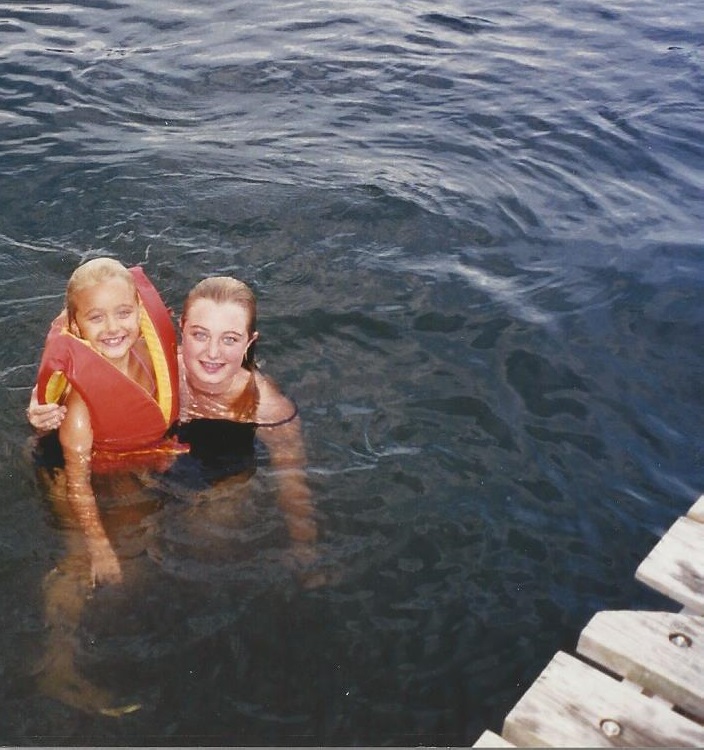This essay is part of the Great Lakes Review’s Narrative Map project.
Beach, as we defined it, was a foot-wide strip of mottled sand lining our grandmother’s tiny lot on Budd Lake. Our parents would drag plastic rakes along the length of it, removing clods of asparagus-colored seaweed. We’d sit there until we had octogenarian-wrinkled feet, dribbling dark castles, dodging waves from passing speedboats.
Boat was a tangerine, Seventies pontoon with a sputtering Evinrude. We tried to cram too many people on and it sunk, just a little. The brown, faux leather benches were book-ended by cracked cup-holders that inevitably spent the summer humming with hornet’s nests. One of the boys built a swimming ladder and we bungeed it to the front deck. There are few things higher than the side of a pontoon boat, when you’re standing on the edge and working up the nerve to jump.
Dock was a rotted out wooden mess, boards slippery with algae and stub-toe angled, concluding in a twelve-foot drop-off full of pebble-circled fish beds. There were several modes of travel used to propel oneself into the murky water at the end. First, the old standby, run and jump. Extra points if you were racing somebody else, extra points if you splashed in further out, extra points if you shoved them off the side before they could get there. Then there was the close-your-eyes-and-walk-off, for those of us who liked a little mystery, who liked the feeling of the world disappearing underneath us. There was the spin, the cannonball, the bellyflop, the imaginary-vine-swinging-Tarzan, the shout-a-message-before-you-go-under. I would not recommend the ride-your-bike method, which resulted in a grounding and rust.
Fireworks, at least the good ones, were a crime. We were undeterred. At around 10 p.m. on Independence Day, we’d start competing with the dentist who lived across the way, trying to impress each other with who had been able to sneak back the most dangerous ones from out of state. I learned one of my first lies when the county sheriff’s boat beached silently on our shore: no officer, I think that was somebody else.
Hammock was not only a place to read a good book when the shyer among us were people-tired. No, it was also an open challenge, a place which could be filled with any number of family members, if you worked hard enough. It was a place to see how high you could push a cousin without getting yelled at, a place to see how hard you had to rock to fall out and injure yourself.
Muskie was another name for fear, for shadows that lurked beneath the surface, ancient and big-teethed. I’d see them on the front page of the Clare County Cleaver, heavy in a grinning angler’s arms. I’d think about this while swimming, the fish just beyond my toenails, waiting to chomp me into tiny pieces with his endless teeth.
Parade was two things—the candy-slinging, fire-trucked, horse-led affair on Main Street, and the more important Fourth of July pontoon parade. Most years we watched, but I remember one particular year when we dressed the old orange boat in clashing pink and blue streamers. The aunts made poster board cutouts in the shape of kidney beans and we pinned bedsheets into gigantic diapers over our bathing suits. This was at the height of the Beanie Baby craze, and our family was not one to resist the opportunity for a terrible pun. We won third place and felt cheated for it.
Party was a joint birthday held annually, to celebrate the eight or so of us who were born in late July and early August. We’d circle our lawn chairs and open gifts, all at the same time, shouting thank yous over one another, trying desperately to get the attention of gift-givers. Since time immemorial, we had passed around the same wrapped boxes, reusing them year after year until the wrapping paper ripped or started smelling funny. We each had our own cakes and we lit the candles simultaneously and wished together, then sang: happy birthday Dear Sara-Kristen-Matt-Lauren-Brent-Pam 1-Bob-Pam 2, everyone choose your own order, happy birthday to you.
Toilet, if you were lucky, was smaller than a closet in a parked motor home. You used the bare minimum of tissue and prayed for a working flush. If you were unlucky, it was a trek up a hundred steep stairs, a dash across the road, and a search for a tricky hidden key to our grandparents’ house. If you didn’t make it, or you were drunk/male/lazy the “toilet” was the woods.
Under was quiet, and we would listen to each other speaking, trying to guess which words were said. We would try and try and try, saying it slower, louder, until the listener popped up, triumphant, understanding.
“We” was a word we used when we meant family, when family meant constant and supportive and comforting. “We” was an exclusive club, knit tighter than a potholder, opening only for children and spouses and the occasional trusted friend. “We” does not mean the same thing, not since Alzheimer’s and cancer and geographical distance opened up the seemingly unbreakable knots that held us together. I remember that sometimes, when were out on the lake, we’d forget to put down the anchor. It was not noticeable at first, the drifting, with our eyes closed to the sun or fixed on our bobbers. But then somebody would catch a fish, and we’d realize just how far away we were from where we had intended to be.
Lauren Boulton
Lauren Boulton is currently an MFA candidate in poetry at Bowling Green State University. Her work has appeared in Kenning Journal, Eunoia Review, and Cardinal Sins.
